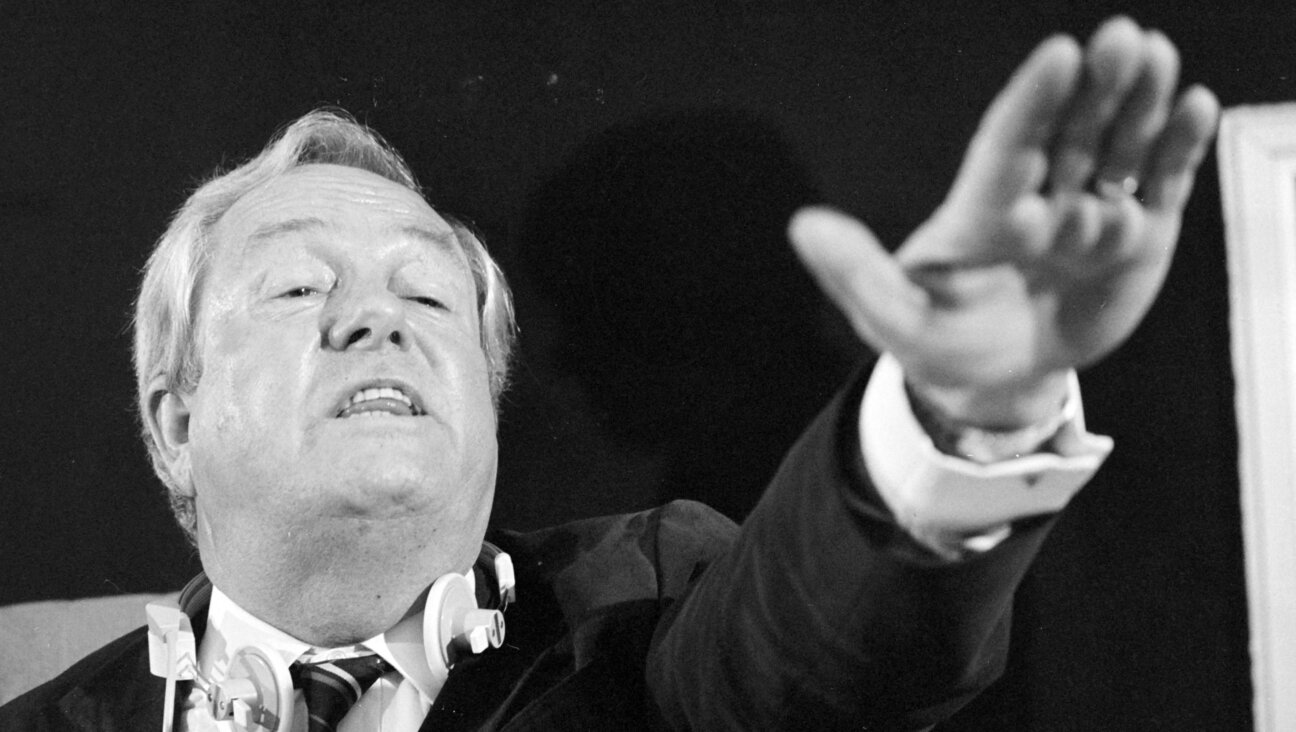An Israeli Disconnect on the Two-State Solution

Fool?s Errand? Tzipi Livni is pushing for peace talks now. But right-wing members of Israel?s coalition government say they don?t support the two-state solution. Image by getty images
Something important happened in Israel’s Knesset the other day. It was one of those incidents you might be tempted to ignore — just another spat over peace, Palestinians and territories.
On examination, though, what happened May 21 could tell you a lot about Israel’s complicated diplomatic position right now. It also helps explain some of the venom that’s infecting American Jewish public discourse on Israel.
What happened was a catfight among lawmakers over the Netanyahu government’s negotiating stance toward the Palestinians. What made it particularly interesting was that the fight was mostly between opposing factions within Prime Minister Netanyahu’s governing coalition. Opposition lawmakers mainly watched and kibitzed.
What made it particularly momentous was that it happened just two days before Secretary of State John Kerry was due in Jerusalem to resume his mediation effort. A substantial portion of the coalition, it turned out, wished he would stay home.
In effect, the Knesset was finally debating the question of whether to accept a Palestinian state alongside Israel, after decades of nibbling around the margins.
The occasion was an appearance by Justice Minister Tzipi Livni before the Knesset’s foreign affairs and defense committee to discuss the upcoming Kerry talks.
“My policy and that of the prime minister is that a solution of two states for two peoples must be achieved,” said Livni, a former foreign minister whose portfolio includes managing peace talks.
In reply, lawmaker Orit Strook of the Jewish Home party noted an awkward fact: “Two states for two peoples might be Netanyahu’s position, but it is not the official government position. It is not part of its basic guidelines.” A string of Jewish Home and Likud lawmakers seconded her.
Strook touched a raw nerve in Israeli diplomacy. Netanyahu has spent four years urging a two-state compromise. But he’s never sought or received formal government or Likud endorsement. His current coalition is deeply divided. Well over a third of his 68 lawmakers are opposed. Most of that group favors keeping all or most of the West Bank and quashing future Palestinian statehood.
Another group accept territorial concessions in principle, but believe it’s dangerous to negotiate now because the Palestinians seek Israel’s destruction and would only use Israeli concessions to weaken Israel.
Israel has been ambivalent about the West Bank since capturing it in 1967. The government announced at the time that it was holding it as a bargaining chip, to trade in return for peace with its neighbors. A minority believed it was Israel’s by right of history or religion. For decades the question was moot, since no Arab authority was offering to trade peace for land. Over decades of stalemate, increasing numbers of Israelis grew skeptical that peace would ever come and comfortable possessing and settling the territory.
Israeli public diplomacy has tried continually to win international support for its position that it has a solid moral claim to the disputed areas. It’s been a colossal failure. In 46 years of trying, not a single government anywhere in the world has been convinced. For much of that time it didn’t matter. Palestinian rejectionism and terrorism made the question moot.
In the past 25 years, however, the tables have slowly turned. Since the Palestine National Council voted in September 1988 to accept the principle of partition into Arab and Jewish states, Israel has found it increasingly difficult presenting the case in the diplomatic arena that its existence is threatened.
In two arenas, Israel diplomacy has been very successful. A strong bloc of Christian conservatives has come to embrace Israel’s religious claim to the entire West Bank. Separately, most of the Jewish community, especially in America, has internalized Israel’s claim that its existence is threatened by continuing Arab rejection.
The Oslo accords in 1993 supposedly tested the Palestinian change of heart. The accords’ collapse into mass terrorism in 2000 destroyed whatever trust had been gained, and strengthened the popular Israeli view that there was no partner.
But one important Israeli constituency didn’t share the popular pessimism: the security establishment. Starting in early 1988, when Military Intelligence first concluded that the PLO had turned a corner toward accepting Israel, the country’s military and intelligence chiefs have been increasingly united in the assessment that peace with the Palestinians was possible and would benefit Israel militarily. Since then, the same events that have soured the public on trusting the Palestinians have strengthened the military’s view that an agreement is urgent.
Thus, torn between optimism and alarm, the Israeli electorate has wavered for two decades, seesawing between the conciliatory governments of Yitzhak Rabin, Ehud Barak and Ehud Olmert and the hardline governments of Netanyahu, Ariel Sharon and Netanyahu redux.
Strangely, no such ambivalence has shown up in the American Jewish community’s public life. The main organizations and their leaders, the ones that raise tens of millions of dollars, reach hundreds of thousands of households — and most important, sway Congress — continue pumping out the same alarms they’ve been broadcasting for a half-century, as though nothing’s changed since 1985.
They’re regurgitated daily in editorials and op-ed essays, action alerts and electronic news digests. Every tinpot Arab who bashes Israel is the subject of dozens of urgent alarms. Interviews and speeches by Palestinian Authority leaders reiterating their commitment to coexistence and negotiated peace go unheard.
Stranger still, they’re trying to defend Israel by promoting doctrines that are, often as not, the opposite of what Israel’s actual defenders think. If you follow Israeli affairs from these shores, you’ve certainly heard that the so-called Arab Spring has left Israel surrounded by unprecedented new dangers. If you happened to attend the Jerusalem Post Conference in New York April 28, you would have heard a parade of Israel’s most senior military and intelligence figures declaring—unanimously—that Israel is more secure than it’s been in years because its neighbors are consumed with their own internal chaos.
Strangest of all, when friends and lovers of Israel hear from Israeli generals and spymasters, as they’re doing with increasingly frequency these days, they tend to respond not with reexamination but with disbelief and anger. That was the response from the audience at the last two Jerusalem Post conferences. That’s been the overwhelming response to “The Gatekeepers,” the Oscar-nominated Israeli documentary in which all six living ex-Shin Bet directors call for a change in Israeli policy and an end to the occupation of the West Bank.
You hear that they’re grandstanding. Or running for office. Or that the architects of Israel’s spy network were duped by a filmmaker. Or — I get this constantly — that they don’t know what they’re talking about. What do the heads of the Israeli army, the Mossad and the Shin Bet know about Israeli defense?
If it seems like you’re hearing about this a lot lately, that’s because Israel’s world-renowned security experts are speaking out more than ever before. The reason is that they’re scared.
Not scared of Syria or Iran. They’ll tell you they know how to handle problems like that. No, they’re scared that Israel is painting itself into a corner, turning itself into an international pariah. They’re scared that Israel will be boycotted, shut off from international credit markets, unable to buy spare parts for its tanks.
They’re scared that the next generation will move to Berlin and Los Angeles. That the Zionist dream will die. That’s why they’re speaking out — in newspapers, at conferences, in films.
And on May 21, former Mossad agent Tzipi Livni took the fight right to the Knesset.
Contact J.J. Goldberg at [email protected]
A message from our Publisher & CEO Rachel Fishman Feddersen

I hope you appreciated this article. Before you go, I’d like to ask you to please support the Forward’s award-winning, nonprofit journalism so that we can be prepared for whatever news 2025 brings.
At a time when other newsrooms are closing or cutting back, the Forward has removed its paywall and invested additional resources to report on the ground from Israel and around the U.S. on the impact of the war, rising antisemitism and polarized discourse.
Readers like you make it all possible. Support our work by becoming a Forward Member and connect with our journalism and your community.
— Rachel Fishman Feddersen, Publisher and CEO
























